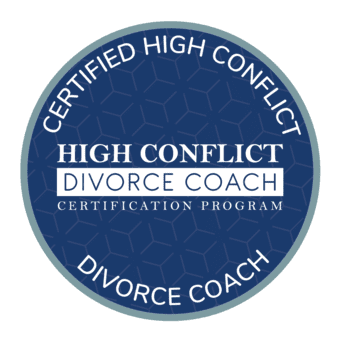Going through the hell of a divorce or custody battle with a narcissist? You don't have to do it alone.
This doesn't have to be your story. I can help you rewrite it and create a brighter future.
What you'll get from my coaching
A clear strategy for dealing with your ex that's customized to your situation
Techniques for responding effectively to your ex's accusations
Tools to help you avoid getting sucked into the conflict that your ex is creating
A system for keeping track of the ins and outs of your case
No-risk money-back guarantee—if you don't get at least one actionable item from me, I'll return the fee for your first session.
Disclaimer: I am not a lawyer, so I cannot give legal advice.
I can help you communicate more effectively with your lawyer.
Single Session
Setting goals and finding a way forward- Pinpointing obstacles
- Identifying your most urgent needs
- Defining a strategy for getting through your divorce
- You'll leave the session with an individual action plan you can implement right away.
4-Session Coaching Package
Get on top of your high-conflict custody battle- Communicating with your ex
- Parenting with your ex
- Preparing for custody evaluations and court hearings
- Supporting your children
- Effective documentation
8-Session Coaching Package
Because a high-conflict custody battle is a marathon, not a sprint- Communicating with your ex
- Parenting with your ex
- Preparing for custody evaluations and court hearings
- Supporting your children
- Effective documentation
- Ongoing coaching to take your power back


Here's what people I've worked with say about me.
Rina is an amazing coach. Not only does she help you navigate and learn the patterns to look for, but she truly takes the time to get to know you. Her advice is tailored to your life circumstances. We are all living a hell and trying to rebuild not only our lives but also ourselves. After our first session, I could truly tell that she works for the individual and not a “client.”
I have been extremely fortunate to have been coached by Rina during my divorce from my ex-husband. It was a high-conflict situation and all the while, Rina helped facilitate the process by giving me the tools to speak to my ex and interpret the situation from the perspective of someone who had already dealt with domestic violence. I am forever grateful to her for educating me on the dynamic and the best route to take. She is knowledgeable, effective and patient. These are all qualities needed in a good coach
Frequently Asked Questions
How can I afford a high-conflict divorce coach? I'm already paying a fortune in lawyers' fees.
Working with me will actually SAVE you lawyers' fees.
That's because the skills you learn from me in improving your communication with your ex, developing and sticking to a strategy, learning how to document effectively, and optimizing how you come across to courts and experts involved in your case will make it easier for your lawyer to represent you and cut down on the time they spend on your case.
What does your fee cover?
My fee covers the time spent in face-to-face coaching. It also includes my preparation time and the time I spend creating the summary and action plan that I send you after the coaching session.
What does a high-conflict divorce coach do that a lawyer doesn't?
As a divorce coach, I act as your sounding board and provide emotional support, something very few lawyers have the time to do. Even when they do, this can get very expensive for you as their client. I also help you work on your communication skills, documenting for your lawyer and your strategy.
Why a high-conflict divorce coach? Can't I just hire a regular divorce coach?
If the other party in your separation or divorce is generally emotionally healthy and is able to have some degree of self-insight, a regular divorce coach will probably be right for you. Divorce coaches help their clients clarify their goals and manage their expectations about the divorce process. They often ask open-ended questions that identify their clients' wants, feelings and core values which often get lost or neglected during the marriage.
On the other hand, if your ex is frequently abusive and has traits of narcissistic personality disorder, you're better off getting help from a high-conflict divorce coach.
A high-conflict divorce coach (HCDC) does all of the above, but also works as a strategy partner for their client when the other party in the divorce or separation is abusing them. A HCDC has specialized knowledge about post-separation abuse and how to counter it. Very often, a HCDC has been through a high-conflict divorce or separation themselves.
Both types of coaches assist their clients with communication skills. However, the approaches taught by a regular divorce coach can be counterproductive if their client's ex is abusive. A HCDC teaches approaches that are more effective for communicating with a personality-disordered person.
How long will we work together?
This is up to you. If you have a specific issue that you need help with, then one or two sessions are enough.
If you need help with several different aspects, then it's best to book a package, because this will be better value for you.
How can I prove that my ex is the problem, not me?
The court doesn't know you or your ex and will always assume that both of you are contributing to the conflict. The best way to show them that you're not part of the conflict is to keep your side of the street squeaky clean.
Yes, this is unfair. Nobody's perfect. Unfortunately, even in cases where one partner is clearly abusive, courts often take a “both-sides” approach to high-conflict divorce and custody cases. I can teach you how to optimize your presentation and recover from past mistakes.
What's the difference between psychotherapy and coaching?
Therapy explores what has happened to you in the past, to help you understand and deal with the present. Also, therapists are qualified to deal with mental health issues, whereas these are outside a coach's scope.
Coaching focuses on how to make changes going forward. It helps you identify obstacles and problematic behaviors, set goals and develop actionable strategies.
How can I protect my children during a high-conflict custody battle?
No matter how nasty and abusive your children's other parent is, the best thing you can do is never to deride your ex, your ex's family or anyone on your ex's side to your children or in your children's presence. If your ex does this, it's all the more important that you don't. Your children need to see and experience a healthy parent who doesn't involve them in a high-conflict custody battle.
A high-conflict divorce coach will help you develop tools and strategies for responding appropriately to your children's needs and questions and counter their other parent's harmful parenting.
How do you work with me?
Once you've paid the fee, we schedule a session on Zoom. At that time, I'll send you your intake form or your update form for you to complete and send back to me at least 24 hours before our session. This will help me prepare for our session.
We'll connect on Zoom at the scheduled time. You can talk with or without video but I prefer video because it facilitates more effective communication. Within 24 hours of our session, I'll send you the summary of our discussion and the action plan with your next steps, as well as any useful resources.
What if I'm worried about my ex getting access to your notes or our communication through a court order?
This is a theoretical possibility because courts have been known to subpoena the notes of therapists etc. during the discovery stage of a case. However, it's incredibly rare that they do this for a divorce coach. The court issuing the subpoena may not have jurisdiction over the coach, particularly if they're in another country or even another state or province.
If you're worried about your ex gaining access through a subpoena on you, or through digital stalking, you could create a new email address for anything to do with your divorce or custody battle or have a friend you trust receive your post-session summaries and action plans and print them out for you.
I'm in an abusive relationship and I'm thinking about leaving my partner. What should I do?
- Don't give your abuser any hints that you're planning to leave.
- Talk to a professional (e.g. through your domestic violence hotline or a women's shelter). This will help you get clarity and find a way to move forward.
- Consider that your partner might be monitoring you through you’re an app on your phone, a keylogger on your computer, a hidden video camera, GPS tagging and other methods. Act as if they are. You can never be too paranoid.
- Start making copies of important documents (for you and your children) and store them somewhere away from home so your partner can't find them.
These include:
Birth certificates
Social security cards
Passports
Financial records and bank statements
Documents relating to your house, like mortgage agreements, rent agreements, etc.
Tax returns
Documents relating to vehicles and other valuable assets
- Start putting away money any way you can. When you're doing your grocery shopping, you could buy prepaid credit cards. Put away a few dollars in cash every time you can and give it to someone you really trust to look after, along with the prepaid credit cards. At any rate, store it away from home, so that there's no chance of your partner accidentally coming across it.
- Start making a list of the things you'll absolutely need or that mean a lot to you, as well as where they're kept. That way, when you do leave, you'll be able to grab them in the shortest time possible.
- Photograph everything of value in the house. You might need these photos, later on, to prove the value of assets for property issues.
- Document any instances of abuse by your partner against you or your children. If it's physical abuse, take pictures of any visible injuries and have them documented by a doctor. If you feel safe enough, tell the doctor how the injury happened so that they can document this. Take photos of damage to property and keep copies of receipts and other documents for the repair/replacement of the property. Keep a journal of the incidents, as well as any other incidents involving emotional or verbal abuse. If there are witnesses to these incidents, note who they are and keep their contact details. The most important thing is to stay safe and your safety comes before documenting abuse. Keep any documentation somewhere your partner can't find it or get access to it.
Do you also do mediation?
No, I don't.
I'm a victim of parental alienation. Can you help me?
If your ex is manipulating your children into rejecting you, I can help you identify what aspects you can control and change and develop a strategy for doing this. I don't encourage any kind of forced reunification therapy, reunification camps, or anything that traumatises children even more than they are already.
I'm being accused of parental alienation. Can you help me?
It's very common for abusers to accuse their exes of alienating the children, as they're threatened by the other parent's connection with the child and their abusive nature makes it impossible for them to connect with their child.
I'll help you identify the circumstances that your ex might be exploiting to try and make claims of alienation stick. We'll develop a strategy for countering these claims and set out specific actions that you can take to execute this strategy.